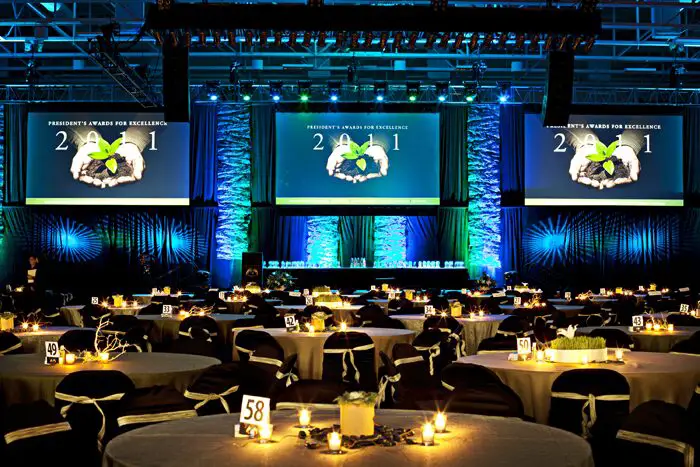10 Things You Didn’t Know Your Corporate Event Needed

Corporate events are hard to organize at times. There are numerous things you need to take care of if you want everything to go according to plan. With that in mind, we’re going to present to you today a few things that you might not have realized you needed for your corporate event.
1. Begin Planning At Least Half a Year Ahead

Your event needs planning. Any event needs planning. But a corporate event requires meticulous planning. There’s a reason we felt the need for repetition. Don’t try to organize such things from one day to another because you’ll inevitably fail. You’ll be spending a lot of time writing emails, making phone calls, and so forth.
Trust us, you’re better off planning in advance. Also, take note that you’ll need to rely on other people (including vendors and partners). And those people might have other plans or tasks.
2. Talent Buying
Some corporate events could use a little entertainment. If your event lasts for at least a couple of hours, consider hiring a local band or artist to make the crowd have a little fun between keynotes. Preferably, you’ll want to assign this task to someone who has organized concerts or other entertainment events before.
3. Have a Master Sheet Handy
A master sheet is exactly what you think it is. It’s a piece of paper with every vital information that everyone on the team should know. While you can keep this document in EverNote, Google Drive, or similar apps, we recommend having at least a few copies printed out. Here are some examples of what that master sheet absolutely needs to include:
- Vendor contact information
- Wi-Fi passwords
- The event checklist
- Supplies location(s)
- Timesheet

4. Collect Meal Preference Information
Not everyone eats the same things. Some people are vegan, others are on a diet, a few might be lactose intolerant, and so forth. It’s better to ask everyone in advance about these kinds of things before even contacting the catering service.
In addition, you can also ask people what exactly they prefer eating. How come? Well, even if someone is a meat lover, they still prefer one type of meat over another. Same with vegans or vegetarians – they love certain vegetables over others without a shadow of a doubt. Knowing this in advance will save you and the catering team a lot of trouble and time.
5. Have a Team Responsible For Lost & Found
It’s not uncommon for guests to lose their stuff at events, especially if that event involves an afterparty and some drinks. They might lose their car keys, wallets, and other valuables. In this regard, you need at least two people who can manage to stay alert and find dropped items.
You might want to create a chat group where every participant will join the discussion. With that said, there might be times when items will be permanently lost. To prevent being sued for this or other mishaps, we recommend getting event insurance from providers like Eventsured and other similar ones.
6. Charging Stations
We live in the digital age, and it shows. People use phones, laptops, tablets, and so forth. If your event more or less obligates them to use such things for different reasons, then you might want to set a few charging stations here and there.
While the tech itself is fabulous, the batteries tend to be subpar. And because you’ll probably have tens or hundreds of participants at your event, we recommend setting up docking stations to allow people to charge their gadgets without creating a huge clutter.
7. Create a Last-Minute Backup Plan

You can be as organized as you want and some unforeseen stuff will still happen. To what degree that happens depends on numerous factors, such as participants, team members, collaborators, and so forth. It’s out of your control, basically, which is why you need to be prepared.
One thing you can do is get event insurance, as stated above. The other thing you can do is create a backup plan in case one thing backfires. Oh, and be sure to make it clear in your communications if something like this happens. Don’t just send out a last-minute e-mail. Not everyone checks their mail consistently. Send text messages or call if necessary, especially if one person is concerned about that particular change.
8. Have an Emergency Kit Ready
Unforeseen stuff happens almost all the time. That’s why it’s best to be prepared. You should have medical kits handy in case something happens to one of the participants during the event. You’ll want to offer them medical assistance until the ambulance arrives, obviously.
But emergencies don’t just refer to medical stuff. At a keynote, for example, some participants might lose their pens, a case in which you’ll need to provide them with extra ones. Just about anything that your participants are required to bring should be in your emergency kit. We can’t emphasize enough how important this step is, so don’t skip over it.
9. Obtain the Appropriate Licensing
Many people don’t know this until it’s too late, but if you’re hosting a corporate event that also involves music or alcohol, you might need a license for those things depending on the jurisdiction where the event takes place.
Corporations usually have a legal department that handles this kind of stuff. However, if your company is smaller, you might not be aware of such issues before it’s too late. Consider contacting a lawyer or law firm when organizing your event to make sure that it’s 100% legal so you won’t have to pay fines afterward.
10. Have a Backup Budget

This step should be obvious, but many people ignore it. Just like we talked about emergency kits, an emergency backup budget is also necessary. The reasoning is the same as with the previous bullet point.
What Are Your Thoughts?
Did we miss anything? Let us know in the comment box below what are your thoughts and advice on this matter. Also, feel free to share it with others who might be interested in the subject.
